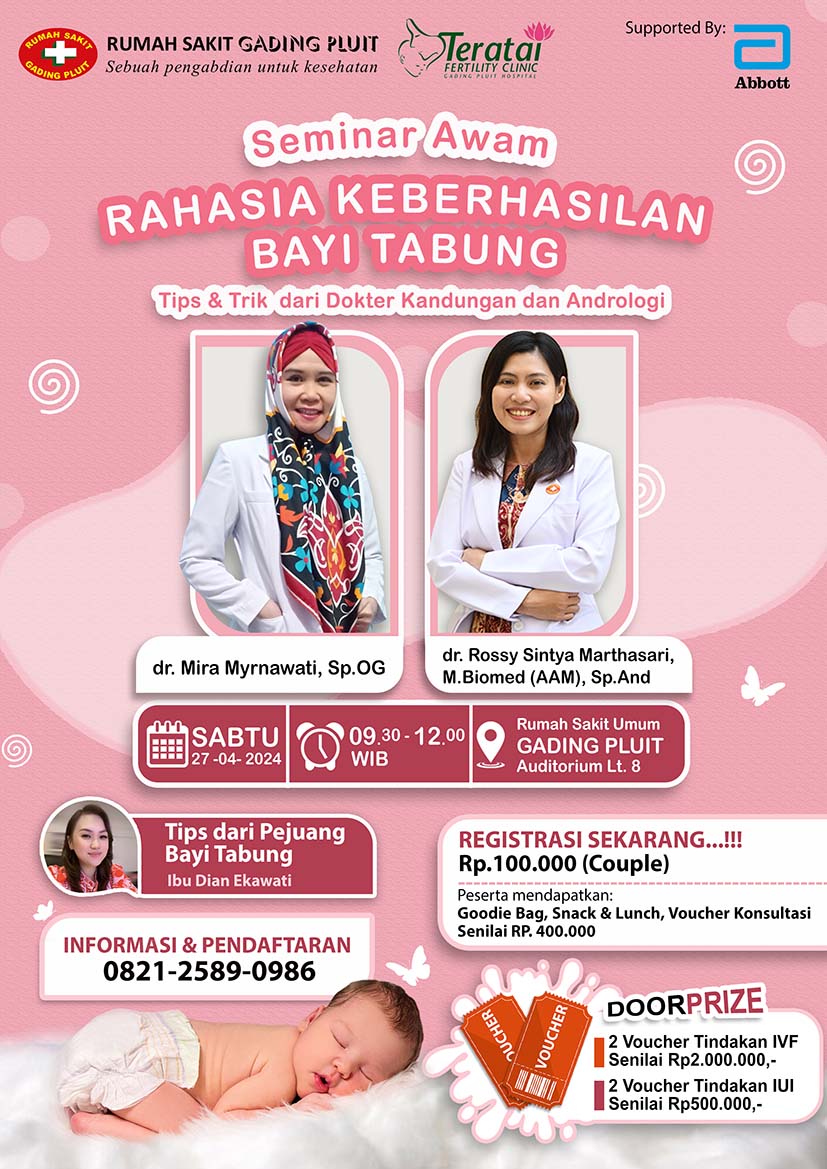
DIABETES PATIENTS HAS MORE DEAF RISK
People with diabetes mellitus are more at risk of hearing loss due to damage to the auditory nerve. The risk is 55% higher than normal people. "The Srinives study showed that diabetes patients with sugar content per 3 months (HbA1C) were greater than 8%, over a period of more than 10 years, the prevalence of nerve deafness reached 85%," said Ear, Nose and Throat specialist from the GADING PLUIT Hospital, Jakarta, Armelia AR, at a medical symposium titled Endocrine Update and Minimal Surgical Management of Endocrine Tumors held at the hospital, Saturday (28/10). The symposium that held as a series of events to celebrate the hospital's of 12th anniversary was attended by 230 doctors from Jabodetabek area.
dr. Armelia explains high blood sugar levels in the long run causes damage to blood vessels. As a result, nerve endings, including the auditory nerve, are damaged. "Impaired blood circulation makes the lack of oxygen in the cochlea in the inner ear, which eventually leads to permanent damage to the auditory nerves in the inner ear," said Armelia. Patients with diabetes who experience the incident will be deaf suddenly. Generally, the disorder is difficult to recover completely. It is caused by progressive degenerative diabetes disease or cause the damage continues to grow worse.However, as long as the attack is still less than two weeks and treated immediately, the rate of healing can reach 50%. "In people with diabetes, sudden deafness may improve, but they can not recover completely, at least, there are improvements," Armelia said. She said improvement efforts on the case could be done by way of therapy.
There are two therapies performed. First, primary therapy is done by administering corticosteroid drugs. Secondly, with Hyperbaric oxygen therapy. Both therapies are performed simultaneously.
THE RINGING EARS
In addition to sudden deafness, diabetics are also at high risk of developing tinnitus. There is a buzzing or noisy sound that appears in the ear or head without any outside sound excitement. The audible sound can resemble buzzing, the sound of the waves, the crickets, the clock beats, and the heartbeat. Tinnitus in people with diabetes is also caused by lack of supply of oxygen into the inner ear. "Although it is not a dangerous phenomenon, the impact is considerable. Work disturbances, quality of life disorders, depression that can lead to death so that counseling is necessary in patients with tinnitus," Armelia said.
According to her, tinnitus can not be underestimated because it can lead to depression. This is because the sound can be very disturbing, ranging from light to heavy scales. "On a mild scale, the noise is not so strong that it is not too intrusive, but on a heavy scale, noise is very disturbing and results in a quality of life impairment.
"For treatment, tinnitus therapy can only be given to patients whose incidence of tinnitus is still within months, by providing vitamins and minerals and anticemas when patients need it. "The main thing is counseling, so our patients give habituation or habituation, explanation that this is harmless and not a problem as long as there is a medical statement that there is no problem in ear, brain, and other organs," said Armelia. He warned, prevention of hearing loss in people with diabetes is done by controlling blood sugar through a healthy lifestyle and drugs. "Get enough rest, exercise regularly, and keep the diet according to the principles of balanced nutrition, stay away from cigarettes and alcoholic beverages," Armelia's notes.(*/H-3)
As published in MEDIA INDONESIA, Wednesday, November 1, 2017

 English
English Bahasa
Bahasa



